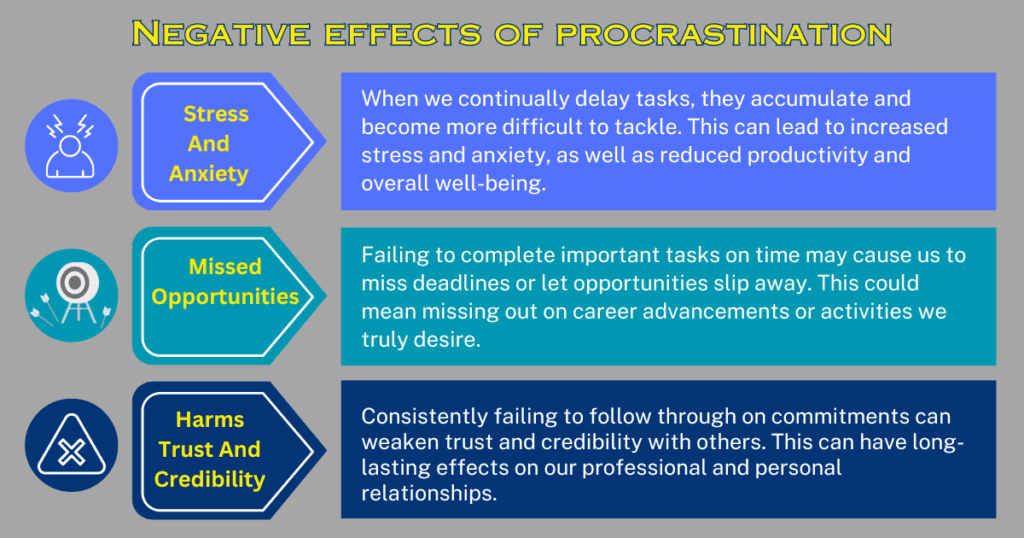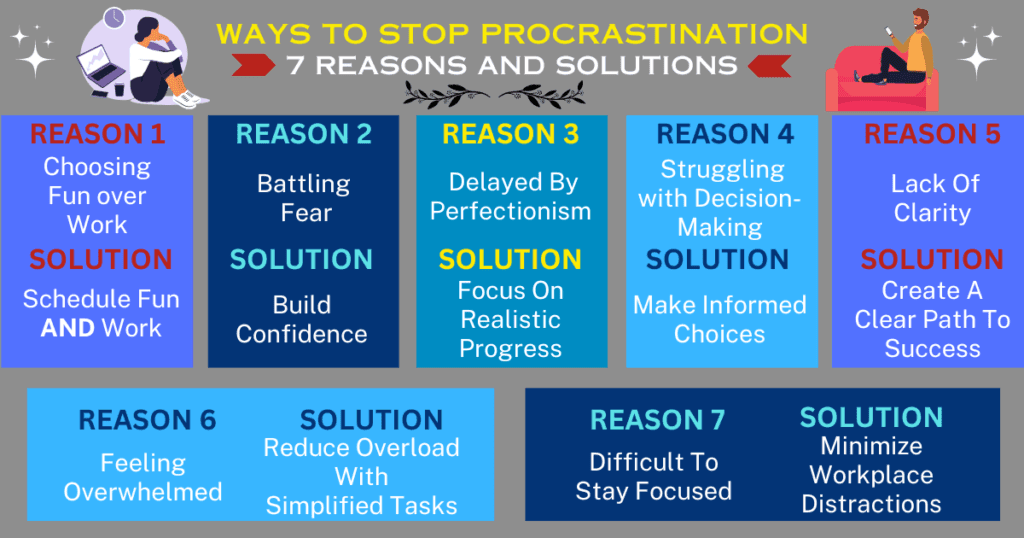DISCLOSURE: This post may contain affiliate links, which means we may receive a commission from Amazon or other affiliate partners if you make a purchase using these links. This is at no extra cost to you. For more information, please read our full Affiliate Disclosure.
Are you tired of constantly putting things off and feeling overwhelmed by your to-do list? Learning how to manage your time well is key to being successful and maintaining a healthy work-life balance. In this article, we will explore effective ways to stop procrastination and take control of your precious time.
By understanding the psychology behind procrastination, we can begin to overcome this self-sabotaging behavior. We will look at a range of triggers and causes of procrastination and suggest solutions.
We’ll also talk about how both your conscious and unconscious minds affect procrastination. We’ll share ways to get your unconscious mind on board to help you feel more motivated and stop procrastinating.
Whether you find it hard to manage your time at work or struggle to stay motivated on personal projects, this article will give you tips and ideas to stop procrastination for good. Get ready to make your plans happen and reach your goals with less worry and more happiness.
What is Procrastination? – Explained in Simple Terms
Procrastination is the act of delaying or postponing tasks, often leading to feelings of stress and anxiety. It involves putting off important activities in favor of less urgent, more enjoyable ones, ultimately hindering productivity and goal achievement. Understanding procrastination and its underlying causes is key to overcoming this common challenge.
The Negative Effects of Procrastination
Procrastination can have several negative effects on our lives:
- Firstly, when we continually delay tasks, they accumulate and become more difficult to tackle. This can lead to increased stress and anxiety, as well as reduced productivity and overall well-being.
- Secondly, procrastination can result in missed opportunities. Failing to complete important tasks on time may cause us to miss deadlines or let opportunities slip away. This could mean missing out on career advancements or activities we truly desire.
- Lastly, procrastination can harm our reputation and relationships. Consistently failing to follow through on commitments can weaken trust and credibility with others. This can have long-lasting effects on our professional and personal relationships.

What Causes Procrastination? – Unveiling the Root Causes
Procrastination is often caused by a combination of factors, including fear of failure, perfectionism, lack of motivation, and poor time management skills. Understanding these underlying causes is key to stop procrastination and enhancing productivity.
Ways to Stop Procrastination: 7 Common Reasons and Solutions
1. Choosing Fun over Work
One key factor is that sometimes we choose to do things that feel good right away. We might watch TV or play games instead of doing things that are important in the long run, like homework or chores.
It’s because we like feeling happy now and don’t like feeling uncomfortable or working hard. This can make us put off tasks that seem hard or not fun.
Solution: Schedule Fun and Work
- Set clear priorities and goals to stay focused on important tasks.
- Create a designated work area free from distractions.
- Use rewards as motivation for completing tasks.
- Practice time-blocking to allocate specific time for work and fun activities.
- Break tasks into smaller, manageable chunks to make them feel less overwhelming.
2. Battling Fear
Another reason is sometimes we’re scared of failing, so we don’t even give things a shot. Other times, we’re scared of doing well because it means having to meet big expectations. But if we work on facing these fears and changing how we think, we can stop putting things off.
Solution: Build Confidence
- Break tasks into smaller, less intimidating steps.
- Visualize successful outcomes to counteract fear.
- Challenge negative thoughts and beliefs about success and failure.
- Take small, calculated risks to build self-confidence.
- Seek support from friends, family, or a mentor to address fears and gain perspective.
3. Delayed By Perfectionism
Sometimes, we procrastinate because of perfectionism. We’re afraid of not doing things perfectly, so we put them off until we feel more prepared or confident. However, this habit can lead to delays and missed opportunities.
Solution: Focus On Realistic Progress
- Set realistic and achievable goals.
- Focus on progress rather than perfection.
- Practice self-compassion and acceptance of imperfection.
- Break tasks into smaller steps and celebrate small achievements.
- Challenge irrational beliefs about the need for perfection all the time.
Unlock your full potential and overcome procrastination effortlessly with powerful hypnosis. Let your unconscious mind pave the way for productivity and success today.
4. Struggling with Decision-Making
Sometimes procrastination occurs because we struggle with decision-making. When faced with choices, we find it challenging to pick the best option, leading to delays in taking action.
Solution: Make Informed Choices
- Break decisions into smaller, manageable choices.
- Consider the pros and cons of each option.
- Seek advice or input from others you trust.
- Set a deadline for deciding to avoid prolonged indecision.
- Trust your instincts and make the best choice with the information available.
5. Lack Of Clarity
Another common reason for procrastination is a lack of clear goals or direction. When we don’t have a clear vision of what we want to achieve or how to get there, it’s easy to get lost in distractions or put off taking action.
Solution: Create A Clear Path To Success
- Break tasks into smaller, manageable steps.
- Set specific goals to clearly outline what needs to be done.
- Seek clarification from others.
- Prioritize tasks based on importance.
- Use visualization techniques to better understand and focus on what matters most.

6. Feeling Overwhelmed
Another trigger is feeling overwhelmed by the size or complexity of a task. When a task seems too daunting, we may become stressed, feel paralyzed, and choose to avoid it altogether. Breaking tasks into smaller, manageable steps can help alleviate this overwhelming feeling and make the task more approachable.
Solution: Reduce Overload With Simplified Tasks
- Prioritize tasks based on urgency and importance to tackle them one at a time.
- Break large projects into smaller, more manageable tasks to reduce feelings of overwhelm.
- Use a task management system or to-do list to organize and track your workload.
- Practice time-blocking or scheduling specific tasks at designated times to create a sense of structure and control.
- Take regular breaks to recharge and prevent burnout. This will allow you time to rest and reset when feeling overwhelmed.
7. Difficult To Stay Focused
External distractions, such as social media, email notifications, or noisy environments, is another reason behind procrastination. These distractions divert our attention and make it difficult to stay focused on the task at hand. Creating a suitable environment that minimizes distractions and promotes focus is crucial to stop procrastination.
Solution: Minimize Workplace Distractions
- Create a distraction-free workspace by minimizing noise and removing unnecessary items.
- Use productivity tools or apps to block distracting websites or set timers for focused work sessions.
- Establish boundaries with colleagues or family members to minimize interruptions during work hours.
- Practice mindfulness techniques, such as deep breathing or meditation, to refocus your attention when distractions arise.
- Break tasks into smaller chunks and allocate specific time slots for focused work to minimize the impact of distractions.
Understanding the Role of the Mind in Procrastination
The conscious mind is the part of our brain that we use to make decisions and plan our actions. When we procrastinate, it’s often because our conscious mind struggles to prioritize tasks or feels overwhelmed by them.
Meanwhile, the unconscious mind stores our beliefs, habits, and emotions, which can also influence our behavior. Unhelpful beliefs stored in the unconscious, such as fear of failure or perfectionism, can contribute to procrastination without us even realizing it.
To beat procrastination, it’s important to take care of your whole self—your mind, body, and spirit. When you focus on feeling good mentally, emotionally, and physically, you’ll find it easier to stop procrastinating and get things done.
Holistic Strategies to Transform Unhelpful Unconscious Beliefs
- Positive Affirmations: Repeat positive statements to yourself to counteract negative beliefs.
- Visualization: Imagine yourself completing tasks successfully to build confidence and motivation.
- Mindfulness: Practice being present in the moment to reduce anxiety and overwhelm.
- Hypnosis: Use guided hypnosis sessions to reprogram your unconscious mind and change unhelpful beliefs.
- Self-Reflection: Identify and challenge any negative beliefs or thought patterns contributing to procrastination.
More Ways To Stop Procrastination
Recognizing Your Procrastination Patterns
To effectively combat procrastination, it’s essential to recognize your own patterns and triggers. Take some time to reflect on when and why you tend to procrastinate. Are there specific types of tasks or situations that consistently lead to procrastination? By identifying these patterns, you can develop personalized strategies to overcome them.
Pay attention to your internal dialogue and the excuses you make for procrastinating. Are you telling yourself that you work better under pressure or that you don’t have enough time? Challenging these excuses and replacing them with more empowering beliefs can help shift your mindset and motivate you to take action.
Effective Time Management Techniques
As you have seen in many of the solutions outlined in this article, effective time management is an important skill for achieving goals. Here is a summary of the key techniques discussed:
- Prioritizing Tasks and Setting Goals: Identify urgent tasks, schedule specific times for them, and break down long-term goals into achievable milestones with deadlines.
- Breaking Tasks into Smaller Steps: Divide large tasks into manageable parts to reduce overwhelm and celebrate progress. Consider using techniques like the Pomodoro Technique to enhance focus and productivity.
- Overcoming Procrastination Through Self-Discipline and Motivation: Establish clear boundaries, eliminate distractions, and create a conducive workspace. Stay motivated by visualizing desired outcomes, seeking support from others, and maintaining accountability.
Final Thoughts: Stop Procrastination and Embrace Productivity
Mastering your time is essential for achieving success and maintaining a healthy work-life balance. Procrastination can hinder our progress and create unnecessary stress and anxiety. By understanding the psychology behind procrastination and implementing effective time and stress management techniques, we can stop procrastination and take control of our time.
Remember, setting clear goals, break tasks into manageable steps, and create a prioritized schedule. Eliminate distractions and create a supportive environment that promotes focus and productivity. Develop self-discipline and motivation to overcome procrastination and stay on track.
With these procrastination solutions and insights, you can turn your intentions into action and achieve your goals with less stress and more fulfillment. Embrace productivity, conquer procrastination, and make the most of your precious time!
Related Resources
Share Your Thoughts And Experiences
Your insights and experiences are invaluable—share them with us by leaving a comment below! We’d love to hear from you.



